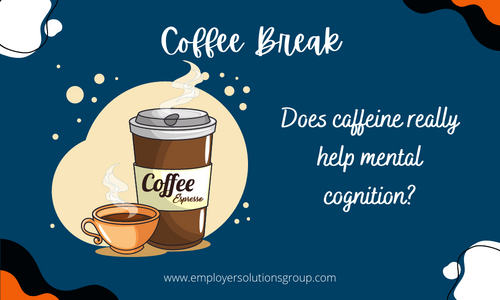
A Quick Coffee Break
Does caffeine really help mental cognition?
If you are a caffeine drinker, you might answer ‘yes’ without a second thought. Here’s some back-up for you.
For most people, caffeine makes you able to put off sleep or improve your alertness when you are tired. Why? Adenosine. Aden-what?
Adenosine, a neurotransmitter that is naturally produced by the brain and influences a person’s need to sleep.
Putting it simply, increased adenosine makes you need to sleep. The brain moderates this and it causes you to have a healthy balance between sleep time and awake time. When awake, your adenosine levels increase, and when you are asleep, your adenosine levels decrease. Receptors in the brain monitor adenosine and slow down brain activity, heart rate, and affect the body’s circulatory system – causing your body to prepare for sleep. Caffeine blocks these receptors.
Other positive effects of caffeine?
No matter how well rested you are, caffeine improves daytime alertness. Some studies suggest that caffeine can have a positive effect on long-term memory. It can also help with reaction time, brain activity, and the ability to focus.
There are a few negative impacts on the brain as well. Preliminary studies suggest an association between caffeine intake and higher stress and anxiety level. In this study, self-ratings by the participants indicated that they had increased tension and anxiety with higher levels of intake of caffeine (more than 600 milligrams). There is also a link to dependency in caffeine users, and a risk of headaches or agitation if the body does not get caffeine in its consistent interval.
The FDA cites 400 milligrams a day is a healthy amount and does not typically come with negative effects or dangers (for average adults, this number can vary). Too much, however, can be toxic to the body (1,200 milligrams). Too little can cause restlessness, insomnia and rapid heartbeat.
Food Insight shares amounts (on average) for several caffeine sources so you can be aware of how much you are taking.

Here’s another way to look at how much is the FDA recommended amount, by source:

Ok, ok, our caffeine levels at ESSG vary by individual, but we do strive to be a great partner to fit your needs. Give us a call!
About the Author
ESSG
Founded in 2005, by an ex-labor law attorney, a financial banker, and a business development expert, Employer Solutions Group's purpose is to help businesses (of any size) , lower the operating costs that come with having employees. Partnering with ESG to assume these responsibilities will increase your company's profitability, decrease employee turnover, so you can stay focused on your business' mission. Someone once asked our CEO what business he was in. His response: “We are in the business of helping people”.



